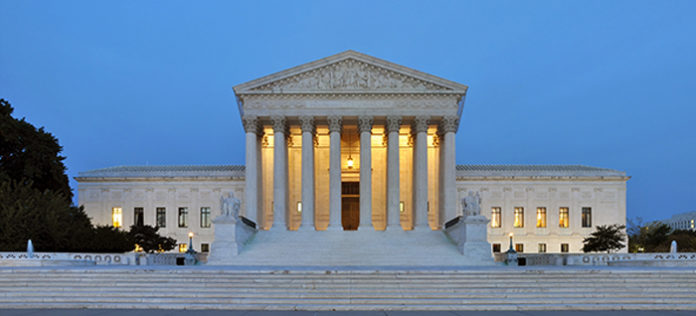
The U.S. Supreme Court has upheld states’ ability to enforce requirements for presidential electors to vote for their state’s popular vote winner. It affirmed a judgment from the Washington Supreme Court and, in a companion case from Colorado, reversed a 10th Circuit decision that struck down Colorado’s law.
Justice Elena Kagan wrote in the majority opinion that precedent has found the Constitution doesn’t bar states from appointing only electors who pledge their votes to their state’s winner. Monday’s decision went further by affirming states’ authority to impose legal penalties on electors who violate their pledges.
“The Constitution is barebones about electors,” Kagan wrote in Chiafalo et al v. State of Washington, the case for which the Supreme Court released a detailed opinion. She wrote Article II includes just the instruction for each state to appoint as many electors as it has members in Congress, and the 12th Amendment instructs electors to meet to vote separately for president and vice president and then send the votes to the Senate for counting. She points out that it addresses “appointments and procedures and … that is all.”
In the Chiafalo case, three electors voted for Colin Powell for president. Their votes were counted, but the Washington Secretary of State fined them $1,000 each. The Washington Supreme Court ultimately affirmed the state’s law. The petition to the Supreme Court in that case had asked the Supreme Court to side with the 10th Circuit and strike down Washington’s law.
Colorado Department of State v. Baca came out of a 10th Circuit decision in 2019, when the court ruled states can’t void votes of presidential electors who vote for a candidate other than the winner of their state’s general election. Colorado had removed elector Micheal Baca and voided his vote after he cast his vote for John Kasich instead of Hilary Clinton in the 2016 election, and the 10th Circuit ruled Baca’s removal violated his constitutional rights. Baca previously told Colorado Public Radio he intended to take enough votes away from then-candidate Donald Trump to keep him from a majority of the Electoral College and send the election results to Congress. A few other electors in Colorado joined the lawsuit, saying the threat of their votes being voided and the possibility of criminal prosecution chilled them from voting for a candidate other than Clinton.
Last October, Colorado Attorney General Phil Weiser and Secretary of State Jena Griswold announced they would petition the Supreme Court to hear the case. During oral arguments in May, Weiser said the Constitution’s power given to states to appoint presidential electors includes the power to remove them. He said the possibility of elector corruption such as taking bribes to vote a certain way or take their state’s pledge and then vote the opposite way were key concerns if states’ requirements for electors were not enforceable.
“When the American people, when Coloradans vote in November, they expect their votes to be counted. They expect electors to act with fidelity to what the people of the state did,” Weiser said in a news conference Monday.
Griswold said the decision’s reinforcement that citizens’ votes count is important in light of increasingly visible tactics to interfere with elections, such as voter suppression and misinformation campaigns. She added she believes the decision makes running misinformation campaigns more difficult because those behind them have to influence millions of voters to sway elections, rather than influencing just a handful of electors.
“This just is one other thing Colorado is doing to lead on democracy at a time when we’re seeing voter suppression; the undermining of rule of law,” she said.
The Supreme Court rejected the petitioners’ argument in Chiafalo that the Constitution’s plain language allows electors to choose whom to vote for. They claimed if the states had authority to require them to vote a certain way, “the electors would not be ‘Electors,’ and their ‘vote by Ballot’ would not be a ‘vote.’”
“Suppose a person always votes in the way his spouse, or pastor, or union tells him to. We might question his judgment, but we would have no problem saying that he ‘votes’ or fills in a ‘ballot,’” Kagan wrote. “…Although voting and discretion are usually combined, voting is still voting when discretion departs.”
In a statement, attorney Lawrence Lessig, founder of EqualCitizens.US, which represented the cases’ electors, said, “When we launched these cases, we did it because regardless of the outcome, it was critical to resolve this question before it created a constitutional crisis. … Obviously, we don’t believe the Court has interpreted the constitution correctly. But we are happy that we have achieved our primary objective — this uncertainty has been removed.”
Justice Clarence Thomas wrote a concurrence, which Justice Neil Gorsuch partially joined. Thomas wrote he believes that because the Constitution doesn’t say anything about states’ authority to bind electors to vote a certain way, states’ rights resolve the case with the principle that states control any powers the Constitution doesn’t delegate to the federal government or expressly bars the states from having.
In the news conference, Weiser said states would not be able to now require electors to only vote for candidates from a certain party. States can’t require electors to vote in a certain way that violates another part of the Constitution, which limits that kind of possibility. But he added states could tell voters up front their votes are only advisory.
“Once people cast their vote, under the right to vote cases, they can’t later be told that their votes won’t be counted,” Weiser said. “And so if people vote for a Republican for president, they can’t later be told, ‘Oh, sorry, your vote doesn’t count.’”
—Julia Cardi

